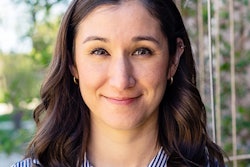Title: Assistant Professor, Department of Architecture, College of Engineering and Architecture, Howard University
Tenured: No
Age: 39
Education: B.A., architecture and visual studies, University of Pennsylvania; and M.A., architecture, Columbia University
Career mentors: Dr. Mabel Wilson, Columbia University; Danielle Smoller, Columbia University; Dr. Hazel Edwards, Howard University; Bradford Grant, Howard University; and Rashida Ng, University of Pennsylvania
Words of wisdom/advice for new faculty members: “Your work matters. Follow your passion and persevere while ensuring that you are practicing self-care.”
When it comes to the study of architecture, often the subject is presented through a Eurocentric lens. But Dahlia Nduom, an assistant professor in the department of architecture at Howard University, is on a mission to change that.
Nduom wants students to gain a better understanding of architecture in the African diaspora in general and in the Caribbean in particular. Through her design studios and her research, Nduom is educating architects of the future and about how there’s much more to Caribbean architecture than what can be gleaned from postcards and brochures for tourists.
“When people think of the Caribbean, there’s a singular narrative of what the architecture is,” says Nduom. “It’s either the thatched roof – like the straw hut on the beach – or it’s colonial architecture, and that’s been it.
“So, there’s these stereotypes around the architecture that has developed over centuries,” Nduom continues. “And there wasn’t a lot being written about the nuances of that architecture, which I discovered when I was trying to teach a class here about it, and I couldn’t find a lot of material on Caribbean architecture.”
The lack of such materials is what prompted Nduom to take a closer look at Caribbean architecture and illuminate the various cultural, environmental, social, and political forces that have affected how Caribbean architecture has evolved – from 16th and 17th century colonialism to 1950s tourism.
One of Nduom’s projects uses Jamaica as a case study to explore the “legacy of colonial and tourism consumption, which has contributed to the narrative of an ‘exotic’ tropical paradise.”
Among other things, the project seeks to analyze images from the 18th and 19th centuries that were “crafted to remove associations of death, disease, and the horrors of slavery” by promoting the Caribbean as picturesque.
Colleagues say Nduom’s research fills a critical void.
“Her research into the architecture and environments of the African diaspora is cutting edge and necessary in adding to the understanding and knowledge of Black experience,” says Bradford C. Grant, professor and interim chairperson in the department of architecture at Howard University.
Nduom’s architectural career begins in the Caribbean. Growing up in Antigua, Nduom says she recognized early on that there was “something really powerful to me about being able to put something out into the world and have an impact on people.” A relative introduced her to architect Andrew Goodenough and asked if he could give her a way to put her knack for drawing to use. She began interning for Goodenough’s architectural firm during the summer while still in high school. She was about 14.
“I was just like learning AutoCAD, helping with the drawing,” Nduom recalls. “That’s what kind of solidified it for me, just being in that office and being able to shadow [Goodenough].”
After she completed high school, which in Antigua typically happens at age 16, Nduom decided to branch out and learn more about the field.
“Being in Antigua, it’s — you know — it’s small, and I thought, ‘OK, I want to kind of branch out and go beyond the Caribbean to get more exposure and experience, which is what led me to the U.S.,” Nduom remembers.
After earning a bachelor’s degree in architecture and visual studies from the University of Pennsylvania in 2006 and a Master of Architecture degree from Columbia University in 2009, Nduom worked as a junior designer, junior architect, and eventually project lead at a series of firms around the world, from New York City to Accra, Ghana. She launched her own firm – an architecture research studio called Dahlia Nduom Design – with offices in Accra and Washington, D.C., from 2015 to 2017.
When Nduom speaks to her students, she doesn’t speak much about projects in which she had a role. Rather, she speaks about how architecture and design can be political – building walls, for instance, to separate people versus building bridges to bring people together. As winner of the 2022 Architect Educator award from the Washington Architectural Foundation, Nduom also stresses the importance of doing what it takes to overcome the many hurdles of becoming an architect, from paying for costly licensure exams to completing the exams in a timely manner. But the payoff, Nduom says, is being able to shape the structures of the society in which we live.
“So, what I tell my students is just, you know, to persevere through it,” Nduom says, “especially if they’re able to get in and have a seat at the table, right, to be able to drive change in the built environment.”


















